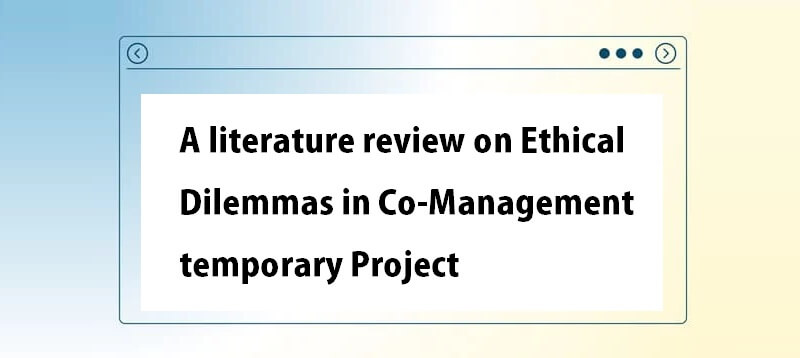A literature review on Ethical Dilemmas in Co-Management temporary Project
in Technology on November 27, 2024Ethical dilemmas are a ubiquitous issue in the modern-day project management environment. During your walk through the thorny world of stakeholder interests, allocation of the available resources, and the organization’s goals, you may find yourself presented with a moral test. This literature review examines the state of the research on the ethical issues in project management literature, and those questions of how well inquiring into their theoretical underpinnings will allow us to move forward. Exploring key themes, emerging trends, and proposed solutions will teach you how your role can be an enriching ethical experience. You must understand these dilemmas to maintain integrity and do the right thing in your project management practice.

Understanding Ethical Dilemmas in Project Management Meta Description
The Character of Ethical Dilemmas
Careful navigation becomes necessary to avoid ethical dilemmas faced by project managers. These are contingent on conditions where there is pressure between the lawful and the right thing to do because of conflicting priorities or competing interests. Project ethical dilemmas can take many forms, such as the pressure to meet deadlines by compromising quality or allocating limited resources among different stakeholders.
Common Ethical Challenges
Some of the most prevalent moral problems in project management include the following:
- Maintaining impartiality while balancing the interests of stakeholders
- Ensuring accurate and transparent project status reporting
- Solving disputes between project requirements and organizational demands.
- Maintaining honesty and responsibility in decision-making
Even when influential stakeholders requested that the Project Management Institute act in opposing ways, it still felt project managers had a moral obligation to act in the project’s best interests.
Resolving Ethical Dilemmas
To resolve ethical issues, project managers ought to:
- Provide explicit rules for behavior and ethics.
- Encourage candid dialogue and openness among team members.
- Develop your ability to resolve conflicts and negotiate effectively.
- Continue to learn about making moral decisions.
A well-designed project management solution can add structure and visibility to a project, reducing potential ethical issues that arise without organization or direction. The project Manager prioritizes integrity and accountability to enable emergency management in ethical dilemmas with trust and a sustainable organizational culture.
Typical Ethical Issues Project Managers Face
The Intersections of Interest and Responsibility
It happens often in a project manager’s career that personal interests go against professional responsibility. This can force you to favor some vendors or team members, sacrificing the project’s integrity. Accountability is dependent on precise standards of bidding and budget allocation. Under no circumstances should you attempt to deflect blame when mistakes occur; instead, capitalize on the possibility of a culture of ownership and transparency.
False Statements and Flexibility
A key challenge is that project status needs to be more accurate. You might be pressured to overlook insufficient information or paint a rosy picture. However, ethical project management imposes accuracy and transparency in communication. Set clear reporting parameters and dare to report the actual project status even if it’s uncomfortable.
Managing Stakeholders and Cultural Sensitivity
It would not be good if the most outspoken or influential stakeholders did not at least attempt to influence you at the expense of other stakeholders. Furthermore, cultural insensitivity can prevent even the most high-flying settlements from succeeding in today’s world. Find out about your company’s code of conduct and encourage a diverse and inclusive working environment.
Safety, Health, and Compliance
The temptation to skip health and safety concerns is more significant when you are under the gun for a deadline or short on budget. Yet, you are morally obligated to your team’s and stakeholders’ welfare. Even in industries that aren’t prone to high-risk activity, stay alert to possible hazards and have prepared tools for warning. You also should ensure strict adherence to legal and regulatory requirements, which can prevent you from getting into ‘compliance’ issues that can cost you a precious project and a company.
Navigating Ethical Quandaries: Strategies and Best Practices
But, of course, project management is all about ethical dilemmas. Project managers are ethically bound to act in the project’s best interests, in good faith, and with integrity for all stakeholders. Being on the receiving end of these complex situations, professionals have any number of strategies and best practices available to help them navigate these situations.
Making Use of Ethical Frameworks
Structured decision-making tools are one effective way. This framework (Search for help, Manage emotions, Anticipate consequences, Recognize rules and context, and Test assumptions) can help professionals navigate ethical issues. The RIGHT Decision Method also invites our attention to dilemmas, looking at different views, finding resources, planning, and acting according to our ethical standards.
Advancing Equity and Openness
Project management is a severe business, and fairness is of the essence; that means impartial decision-making and 100% equal opportunities for every team member. Transparency in the presentation of project status reports managing stakeholder interest should be by project managers. It builds trust and alleviates possible conflicts of interest.
Building Project Management Ethical Competence
To address these problems, studies recommend that the ethical training and decision-making framework needed for the project management theory be integrated into the systems of project management education. Group discussions, the design of ethical dilemmas, and the use of codes of ethics have proved effective pedagogical methods for enhancing project managers’ ethical knowledge and skills. Organizations can equip project managers to better navigate confusing ethical landscapes by driving the development of a culture of ethical awareness and ongoing professional development.
Conclusion
Finally, this literature review has exposed today’s project managers to complex Ethical dilemmas. You have dealt with how globalization, technology, and changing societal values create new dilemmas that need to be carefully handled. By focusing on specific problem spots, such as stakeholder management, resource allocation, and sustainability, you can now see more clearly how complex ethical challenges are in our modern project environments.
You need to keep moving and remain vigilant and proactive about this. As you lead projects into an increasingly complex world, constant learning, dialog, and adherence to what you consider ethical decision-making frameworks will be necessary. When ethics is an equal priority with your traditional project objectives, you have a better chance of reaching more sustainable and socially responsible outcomes.





